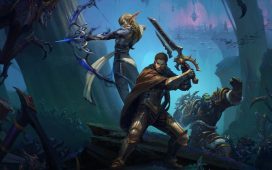Ubisoft’s shared world shooter receives its final verdict, as GameCentral gets to grip with the Dark Zone and endgame.
 Game review: Baba Is You rewrites the rules for puzzle games
Game review: Baba Is You rewrites the rules for puzzle games
The Division 2 is a pretty decent game. There are very few changes since the last one, and it does get a little too repetitive a little too quickly, but for an online title of this size and complexity it works impressively well, and has plenty of content, even at this early stage of its life. But it’s also a game with such a cynically dishonest approach to the politics of its backstory that it can be genuinely disturbing to sit through.
Many younger gamers probably have no idea who Tom Clancy was or why his name is attached to all of Ubisoft’s military-themed games. He died almost six years ago now but it would be fascinating to know what he thinks of how his name is currently being used, because whatever you thought of his conservative viewpoints he was at least honest enough to admit them in public. In his absence Ubisoft has attempted to pretend that their games are completely apolitical, while constantly using imagery and plot-points ripped from the news headlines.
The Division 2 features nothing less than societal collapse and full-on civil war in America and yet despite making references to Trumpian catchphrases and policies, such as the would-be Mexican wall, and featuring in-game locations that range from the United States Senate chamber to a Vietnam War museum the game uses it all merely as surface decoration, terrified that it might say something that would put anyone off from buying it.
To say that The Division 2 is toothless would be an insult to the dentally-challenged, the only glimmer of an exception being the creepy gun fetishism which at times feels like an advert for the NRA (the intro, which asks whether you or your neighbour has a gun, is already deservedly infamous).
A game like this doesn’t have to feature any kind of political message but, as with Far Cry 5 before it, Ubisoft are the ones that raised the issue in the marketing and iconography of the game, and then purposefully failed to follow through with it. If you don’t want politics in your games then just set it on Mars or something. Pretending to address real-world issues for the sake of your marketing and then avoiding it like the plague in the game itself is cowardly and dishonest.
The cravenness of Ubisoft’s writers has a direct effect on the gameplay too, because the refusal to offer any kind of commentary on anything that’s going on makes the storytelling extremely unengaging – something which is exacerbated by one of the dullest collection of non-player characters ever seen in a video game.
In border terms The Division 2 is very similar to the first game, which is to say it’s a Destiny style open world shooter with an emphasis on four-player co-operative play but also a more explicit action role-playing element – where damage given and taken is dependent on stats as well as just your skill at playing the game.
There’s also a heavy emphasis on using the game’s unusual cover system, which allows you to automatically run from one hiding spot to another by targeting where you want to go and holding down a face button. This can be awkward to get used to at first, but it does help to emphasis tactics over straight action – the only drawback being that it tends to make the combat, and many of the set pieces, seem very similar despite the regular changes in backdrop.
There is a problem with repetitiveness in The Division 2 but it’s saved by three things. The first being the wide range of genuinely desirable gadgets (referred to as ‘skills’, for some reason) which you can unlock and upgrade with experience. There are also passive perks but it’s the drones, bad guy-seeking grenades, and glue guns which are the most fun and allow for a great deal of specialisation when working in teams. Something which the excellent matchmaking makes easy whether you have friends that are into the game or not.
The second factor is the Dark Zone, the series’ distinctive PvPvE area – or to put it in English an area where you get to fight both fellow human players and computer-controlled enemies. Previously this was a place only for high-level players, or at least those that can work very well as a team, but the new option to level out everyone’s stats makes them a much more even playing field and as a result a lot more accessible and fair.
And then finally there’s the endgame, which is excellent. It takes a while to get there but when you do you get to choose between three new specialisations, that you can switch between at any time, and use powerful new signature weapons. Then on top of that a new faction enters the game and changes all of the existing missions so that they’re suddenly much more interesting to replay. Ubisoft have clearly put a lot of thought into the endgame and as much as can be judged at this point in the game’s lifetime it seems to have paid off very well.
What’s more questionable though is the loot, which is constrained by both the real-world setting and the dour atmosphere of the game in general. Clothing doesn’t get much more flamboyant than a nice scarf and while the weapons are generally enjoyable to use it’s only really the manually crafted mods that make any interesting difference to how you use them. There are loot boxes for the cosmetics items but their contents are so mundane it’s impossible to feel aggrieved by them.
The Division 2 is not an ambitious sequel but it is a competent one. There are few new ideas but the team have clearly identified the weaknesses in other games and carefully avoid all of them. All of them except the terrible storytelling that is, which is beginning to seem like a traditional part of the whole sub-genre now.
As we’ve said all along, you probably formed an opinion about The Division 2 months ago and there’s nothing hidden in its later hours that is likely to change it one way or the other.
This is a competent, slightly repetitive, but content rich sequel; it’s a difficult game to get excited about but if not for the storytelling a hard one to hate. Whether the apolitical standing bothers you is an entirely personal matter, but it’s especially frustrating when it often seems the most interesting thing about the game.
Tom Clancy’s The Division 2
In Short: An ambitious but competent sequel that already has some of the best endgame content of any similar game… if you can stomach the offensively apolitical, and thoroughly boring, storytelling.
Pros: Mountains of content, solid combat and cover system, and genuinely interesting upgrades and skills. The endgame is extremely well thought out, as is the Dark Zone.
Cons: The plot is offensive at worst and hopelessly dull and silly at best. Few significant changes to the previous games and combat gets repetitive long before the content runs out.
Score: 7/10
Formats: PlayStation 4 (reviewed), Xbox One, and PC
Price: £59.99
Publisher: Ubisoft
Developer: Massive Entertainment, Red Storm Entertainment, Ubisoft Annecy, Ubisoft Bucharest, Ubisoft Reflections, Ubisoft Leamington, Ubisoft Shanghai, and Ubisoft Sofia
Release Date: 15th March 2019
Age Rating: 18
Email gamecentral@ukmetro.co.uk, leave a comment below, and follow us on Twitter
















